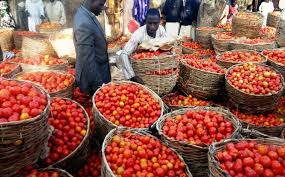…Lagos food market chair blames insecurity, supply shortage
Tomato and pepper, two key ingredients for jollof rice considered to be Nigeria’s national dish, have gone beyond the reach of the average citizen, adding to the pressures already being felt by households across the country.
In markets across many of Nigeria’s cities, three or four medium-sized tomato fruits sell for N1,000, while the smallest portion of red pepper (about six fruits) goes for N500.
This comes as the economy of Nigeria, Africa’s most populous country, has experienced one of its worst downturns in history since May last year when the Bola Tinubu Presidency yanked the subsidy on petrol and left the exchange rate at the mercy of market forces.
Naira, the local currency, has been on a free fall against international currencies, and inflation has maintained an upward trend, reaching 33.95 per cent in May 2024, from 33.69 per cent recorded in April, driven by higher food and transport prices, according to the National Bureau of Statistics (NBS).
Food inflation rose to 40.66 per cent in May, from 40.3 per cent in April.
SBM Intelligence, in an April 2024 report, put the cost of making a pot of jollof rice at N16,955 as at March 2024, from N13,106 in October 2023.
“Between October 2023 and March 2024, data tracked by the Jollof Index showed that the cost of making a pot of jollof rice increased by 29.3%, from ₦13,106 in October to ₦16,955 in March 2024,” the research firm said in the report “The SBM Jollof Index: Crisis at the table”.
“Apart from the effect of the Naira devaluation, the price of rice drove inflation during the period. A bag of rice increased from about ₦56,000 in October 2023 to approximately ₦87,000 in the first week of March 2024,” it said.
The cost of tomato and pepper has certainly worsened an already bad situation.
SBM also blamed the rising food prices on other long-standing issues, such as conflicts in food-producing regions, reduced arable land, climate variability, increased energy costs, and restrictions on foreign exchange for specific food items.
On Monday, chairman of the Mile 12 International Market in Lagos State, Shehu Usman Jubrin, pinned the high cost of tomato, pepper and other perishable items on insecurity in the North, supply shortages, and pests and diseases.
Mile 12 Market, estimated to have over 500,000 regular traders daily, prides itself as the home of affordable varieties of foodstuffs, from pepper to tomato, yam, onions, plantain, and so on.
“The bone of contention, the real fact is just insecurity. Let me tell you, that’s the truth. And there’s absolutely nothing the country will do. This price hike will continue. They are still buying tomato at the rate of N1,000 for three pieces,” Jubrin said on Channels Television’s “The Morning Brief”.
“Ninety-nine per cent of the people in IDP camps are farmers. They don’t know anything apart from farming – both male and female. The people who are on the farm and are farming with one eye closed are just about 1,500 out of like 5,000 farmers we have across the whole country,” he said.
Jubrin said in those places, some of the farmers negotiate with and pay bandits before they can go to their farms to harvest the produce.
He also blamed other factors, including supply shortage from the North to the South, pests and diseases.
According to him, tomatoes from the North are available from November, December, January, February, March, and April, up to May, including “danja, danjumi, kadawa, Kano and then Katsina states”.
“This is the off-season now, so we expect tomatoes from Ilaro, Ogbomosho, Abeokuta, and Osun to come to Lagos, you know, and also part of Cameroon. That is a kind of substitute for the northern one,” Jubrin said.
“But unfortunately, it’s late: the one from Cameroon, the one from Abeokuta and Ogbomosho. And as we approach the festive period, tomatoes will be expensive. The northern tomatoes are finished and we don’t have substitutes from the south,” he said on Channels Television.
In May, traders at Mile 12 Market told Nairametrics that the spike in prices of tomatoes was due to the regular seasonal fluctuations in the quantity of the item produced. They said the harvest period for the species of tomatoes being sold at the time was almost over with the onset of the wet season across the country.
Nairametrics quoted Umar Tanko, a tomato seller at Mile 12 Market, as saying that a basket of premium quality fresh tomatoes, which sold for between N50,000 and N80,000 in April, sold for between N140,000 and N150,000 as at May. Similarly, lower-quality tomatoes damaged during the journey from the North to the South, sold for around N60,000 to N100,000 in May, as against N30,000 in April 2024.


